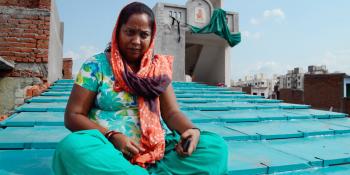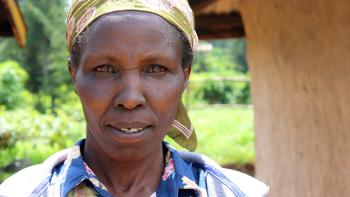
Shelter Venture Fund
Nurturing innovations that improve housing
The Terwilliger Center’s Shelter Venture Fund invests in and nurtures innovative entrepreneurs and small-but-growing businesses focused on improving housing conditions for the world’s 1.6 billion people living in slums or inadequate housing.
Launched in 2017 by Habitat for Humanity’s Terwilliger Center for Innovation in Shelter, the fund catalyzes and expands the affordable housing market by investing in shelter entrepreneurs operating in the “pioneer gap” – where early stage companies are often considered too nascent or too risky for conventional venture capital firms. The intent is to accelerate those entrepreneurs’ pathways to reaching low-income families with products and services that improve their housing conditions.
Impact of the Shelter Venture Fund
- Innovative entrepreneurs and small businesses gain access to funds to grow their operations sustainably.
- Low-income clients gain access to quality goods and services to improve their shelter.
- Housing markets expand, generating employment and livelihood.
“Habitat’s investment was a real game changer for us. … It triggered the forward momentum that brought us to new markets and brought to completion important programming and testing of new technology.”— Nancy Welsh, co-founder and chief marketing officer of iBUILD Global
The Shelter Venture Fund, now positioned to grow its Assets Under Management significantly, has disbursed $3.02 million to 11 companies globally:
-
Improving health and safety with clean cook stoves
Smoke is one of the biggest health hazards across sub-Saharan Africa. Each year, approximately 550,000 people in the region die from respiratory diseases due to indoor cooking fires. BURN aims to save lives and forests through the design, manufacturing and distribution of clean-burning cook stoves across sub-Saharan Africa to the 2 billion people who will inhabit the region by 2050.
-
Improving health and shelter with affordable flooring
Dirt floors in homes contribute to disease globally. EarthEnable is committed to eliminating dirt floors with cheap, easy-to-install, sanitary flooring that can improve the health of low-income families in parts of East Africa, one of the world’s poorest locations. It has successfully installed flooring made of clay earth, sand, gravel, fiber and plant oil in Rwandan and Ugandan homes for 75% cheaper than traditional concrete.
-
Reclaiming sewage water with biomimicry
Eighty percent of India’s sewage is untreated. Urban areas are experiencing a water crisis due to higher population demands and dwindling supply resulting from climate change. Treating sewage water is often ignored due to high costs or lack of awareness. The challenges of water pollution, water shortages and the need for reclamation require sustainable, low-cost solutions. EcoSTP created a patented technology to treat and reclaim sewage water based on biomimicry principles. The solution is eco-friendly, low-maintenance and addresses seven of the United Nation’s Sustainable Development Goals. EcoSTP participated in Habitat’s 2018 ShelterTech accelerator in India.
-
Providing low-cost, eco-friendly water heaters
Energryn is committed to solving the water needs of families across Mexico. It offers hybrid solar-electric water heaters called Solesyto, with a more eco-friendly technology and at lower cost than market alternatives like liquid petroleum gas. Energryn participated in Habitat’s 2017 ShelterTech accelerator in Mexico.
-
Offering affordable electricity in remote areas
In Mexico, over 600,000 households do not have electricity and 8.8 million households have only informal access to the grid. Graviti is a marketplace app that connects distributors of sustainable products – such as electricity, drinking water, heaters, etc. – and microfinance institutions to make these products accessible to low-income households. In 2017, Graviti participated in Habitat’s ShelterTech accelerator in Mexico.
-
Offering mortgage finance to low-income households
South African banks typically do not lend to low-income borrowers. IBUILD Home Loans is currently the only South African mortgage provider to target these excluded households by offering them mortgage loans to construct “separate entrance rooms.” Upon completion, these rooms are rented out to cover the mortgage costs. This new construction typically also generates rental income for the family, while increasing the availability of affordable housing within their community.
-
An app for all housing construction stakeholders to interact and transact
Only 55 cents in real housing is built for every $1 invested in the $1 trillion global informal economy. This is due to fraud, graft, supply theft and a lack of transparency throughout the market. iBUILD Global, a fintech and analytics company, aims to address this challenge by creating financial transparency across the shared ecosystem of funding sources, governments and international agencies. It’s app is aimed at improving resource deployment and unleashing latent building capital by moving investors off the sidelines.
-
An agricultural technology company contributing to inclusive, transparent and sustainable smallholder supply chains that are future-proof
Built on expertise and technology, Meridia offers accurate and reliable field data solutions and software products at scale for smallholder supply chains. The company specializes in collecting, analyzing and verifying high-quality data to accelerate clients’ sustainability and environmental, social and governance commitments.
Accurate farm and traceability data are critical for businesses to comply with ever-stricter compliance regulations and deliver upon sustainability commitments. At the same time, most smallholders continue to struggle to earn a living income, fueling the deforestation and biodiversity crisis. Reliable field data is needed to drive the transformation toward confronting these challenges.
-
Increasing access to affordable roofing in slums
In India, over 100 million people live in slums where families rely on corrugated metal or asbestos cement sheets to cover their homes. Such products have adverse health effects and are financially and environmentally unsustainable over the long term. ReMaterials, an India-based manufacturer, developed a modular roofing product to address the needs of approximately 16 million Indian households that lack adequate roofing. The product affordable, eco-friendly and aesthetically pleasing with its distinctive blue color. Homes stay drier in the monsoon season and up to 18 degrees Fahrenheit cooler in the summer.
-
Providing safe and affordable water to rural communities
Water is a basic human need but more than 25% of the global population does not have safe and affordable access. By designing, building and managing water utilities in rural Cambodia, TapEffect bridges the water access gap for low-income households and supports resilience against the impacts of climate change, including drought and waterborne illness. TapEffect participated in Habitat’s 2021 ShelterTech accelerator in Southeast Asia.
-
Building for a billion with 3D printing
Tvasta is a Bangalore-based startup using patented concrete 3D printing technology to address the affordable housing deficit in India. In 2019, Tvasta participated in Habitat’s ShelterTech accelerator in India. With design support and catalytic funds from the Terwilliger Center, Tvasta completed their first 3D-printed home in 2020 — a model they are looking to bring to scale. In August 2021, Habitat led a $2.35 million investment round in Tvasta, with two other investors.
